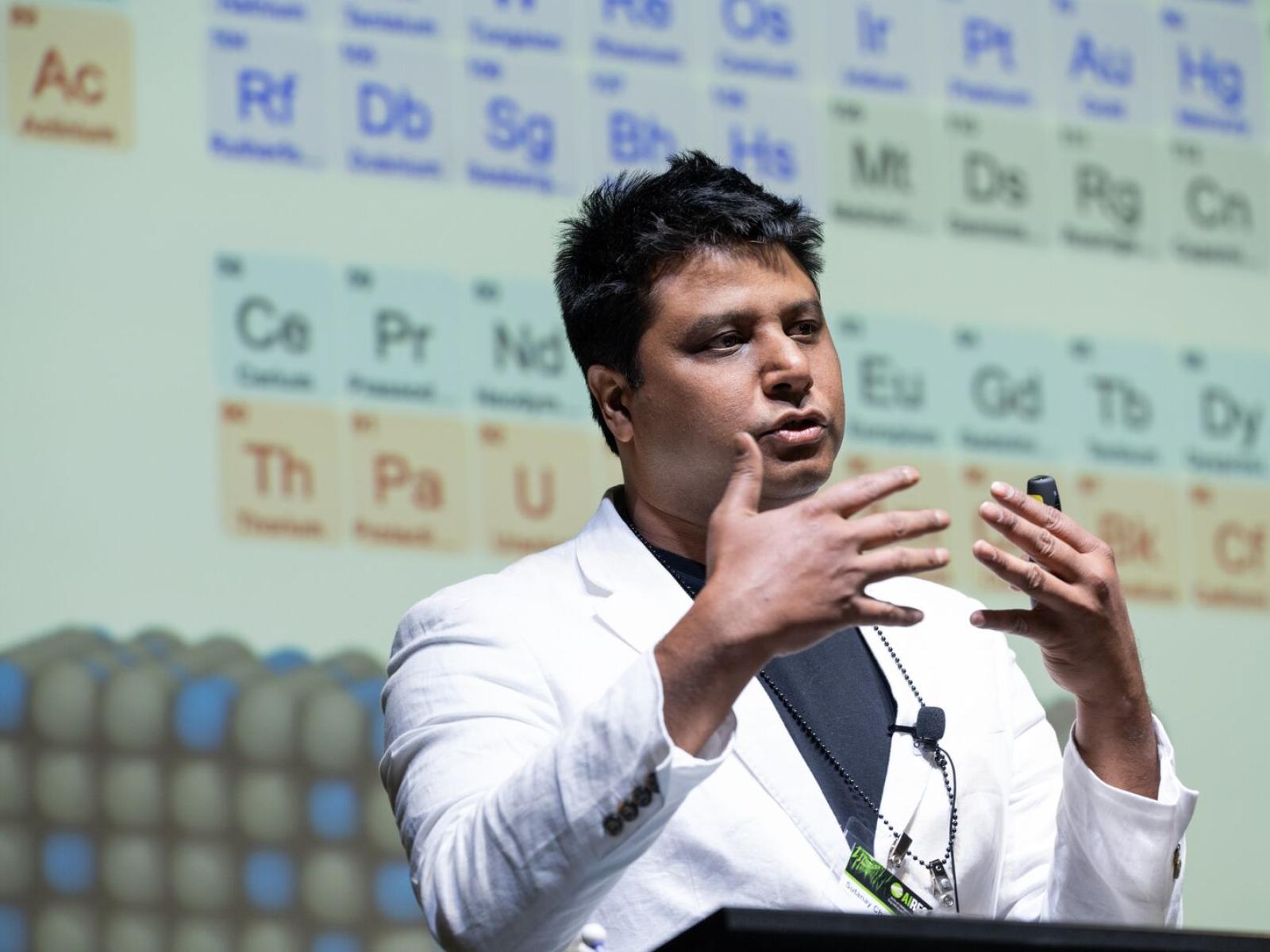PNNL Plays Host to Annual AI Workshop
Previous workshops had been held at Oak Ridge National Laboratory

Sutanay Choudhury, Chief Scientist in the Advanced Computing, Mathematics and Data Division and Co-Director of PNNL’s Computational and Theoretical Chemistry Institute at Pacific Northwest National Laboratory (PNNL), was one of the more than 40 speakers at the Artificial Intelligence for Robust Engineering & Science (AIRES) workshop, held May 21–23 at PNNL.
(Photo by Andrea Starr | Pacific Northwest National Laboratory)
Pacific Northwest National Laboratory (PNNL) played host in mid-May to the Artificial Intelligence for Robust Engineering & Science (AIRES) workshop, an annual event that explores advances in artificial intelligence, machine learning, and technology for engineered and natural systems.
The event, held May 21–23 at Discovery Hall, marked the first time the workshop had been held anywhere other than Oak Ridge National Laboratory (ORNL), where it began in 2020.
PNNL was an appropriate location for an AI-focused event, said Wendy Shaw, PNNL chief science and technology officer, who delivered an opening day welcome to attendees.
“PNNL has significant expertise in AI,” Shaw said. “We have recently launched the Center for AI. We also have the Center for Cloud Computing, a key enabler for AI. There is a lot of excitement and movement in this area right now, with Generative AI, and with the new DOE [Department of Energy] initiative just having been announced. This group has the potential not only to help us realize the acceleration of scientific discovery that could result, but also the ability to achieve this in a way that gives scientists confidence in the results.”
The meeting started with a keynote on a National Academies study on digital twins presented by PNNL Earth Scientist Lai-yung (Ruby) Leung and Derek Bingham, a statistics and actuarial science professor at Simon Fraser University in British Columbia. They spoke about “Foundational Research Gaps and Future Directions for Digital Twins.” In AI, a digital twin is a virtual model of a real-world physical object, system, or process that behaves and looks identical to its real-world counterpart.
The conference featured nearly 40 talks, including one delivered by Prasanna Balaprakash, ORNL’s director of AI programs, whose talk was titled, “Advancing Secure, Trustworthy, and Energy-Efficient AI for Science.”
“It’s important to create awareness about the safety, trustworthiness, and security of AI,” Balaprakash said. “This is what we’re teaching now. How can you evaluate models for safety? How can you evaluate models for trustworthiness?”
The workshop focused on all aspects of multimodal AI and machine learning models, the ecosystem and methods necessary for practical use of digital twins, and the technical challenges associated with developing and using robust digital models.
Bringing AIRES at a venue other than ORNL presented an opportunity to showcase the breadth of AI expertise at other DOE laboratories, said event co-chair Mahantesh Halappanavar, a chief scientist and group leader at PNNL.
“Months of planning were invested in assembling a range of speakers,” said Halappanavar. “We had more than 40 speakers from seven national laboratories, several academic institutions from the U.S. and Canada, and industry.”
Holding the event at a site other than ORNL was a deliberate choice by organizers to broaden the reach of AIRES, said Pradeep Ramuhalli, nuclear instrumentation and controls engineer and a Distinguished Scientist at ORNL.
“As you start building this community, you want to make sure you’re bringing all organizations along,” Ramuhalli said. “AIRES has focused more on the fundamentals of AI and at the needs of AI as applied to both engineering and science applications. AIRES is bringing together individuals who are focused on the AI technology and trying to put together the core capabilities for applications. AIRES is a place that fosters conversation, new ideas, and new teams that can have a big impact on the field going forward.”
Published: May 31, 2024